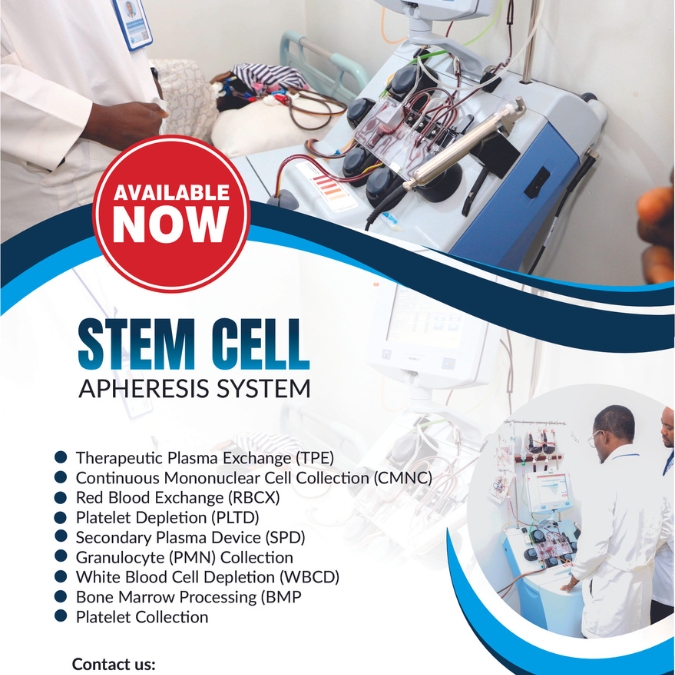Human blood consists of four components: red blood cells, white blood cells, platelets, and plasma. In traditional blood donation, a unit of whole blood is taken from a donor and sent to a laboratory, where it is separated into its four components: red blood cells, white blood cells, platelets and plasma. The components are stored and, depending on the medical need, given to patients after surgery, an accident, illness, or following chemotherapy.
Sometimes, to treat an illness, one of those components may need to be removed or replaced through a process called apheresis.
What is Apheresis?
Apheresis is a therapeutic procedure that involves the selective removal or separation of specific components from a patient's blood while returning the rest to the patient.
In apheresis, a sophisticated centrifuge machine draws blood from a patient's body and spins the blood to separate its elements. The machine sets aside certain elements and returns the remaining blood cells, platelets and plasma to the patient.
There are two reasons why you may participate in apheresis: You're donating blood elements, like red blood cells, for someone else to use, or you're receiving treatment for a medical condition.
Types of Apheresis Therapies include:
- Leukapheresis: This treatment is used to remove white blood cells from the blood. The treatment eases symptoms that happen if a patient's white blood cells are multiplying uncontrollably. Used in the treatment of leukostasis syndrome, leukemia, and certain lymphoproliferative disorders, leukapheresis enables the selective removal of excess white blood cells (leukocytes) from the patient's circulation, thereby alleviating symptoms and reducing the risk of complications associated with leukocytosis.
- Peripheral blood stem cell collection: In this case, apheresis is used to obtain immature stem cells for stem cell transplant.
- Photopheresis: Photopheresis combines a photochemical reaction using ultraviolet light with apheresis to treat certain conditions, most commonly involving the immune system. This procedure changes the lymphocytes so they can do more to fight intruders like cancerous cells and foreign viruses and bacteria. During photopheresis, the apheresis machine removes lymphocytes and treats them with UVA light before they are returned to the patient's body.
- Plasmapheresis (plasma exchange): Providers use plasmapheresis to treat several serious medical conditions through a process called plasma exchange.
- Platelet depletion: Platelets help your blood to form clots. High platelet counts may cause complications like clotting or bleeding. If you have excess platelets, providers will do platelet depletion to remove platelets before returning blood to you.
- Red blood cell exchange transfusion: Healthcare providers use apheresis to remove unhealthy red blood cells and replace them with healthy donated red blood cells.
- Leucodepleted red cell collection
- Continuous mono nuclear cell collection.
What diseases does Apheresis treat?
Apheresis plays a big role in how healthcare providers treat a wide range of conditions. For example, people going through intense chemotherapy for cancer may have apheresis to preserve healthy stem cells that they will receive after recovering from treatment. Apheresis is typically used to treat blood cancers, blood disorders and some neurological disorders.
- Blood cancers
Apheresis may be used to treat:
- Acute myeloid leukemia.
- Certain types of lymphoma, including cutaneous T-cell lymphoma.
- Multiple myeloma.
- Waldenstrom macroglobulinemia.
- Blood disorders
Apheresis is a treatment for many common blood disorders, including:
- Sickle cell anemia.
- Thrombotic thrombocytopenic purpura.
- Neurologic disorders
Plasma exchange is used to treat:
- Guillain-Barré syndrome.
- Multiple sclerosis.
- Myasthenia-gravis.
In addition, apheresis may be a treatment for graft vs. host disease or organ transplant rejection.
What are the advantages of Apheresis?
Apheresis allows health professionals to obtain the correct blood element for a specific condition. This is also how people with certain blood disorders can receive healthy blood cells to replace unhealthy ones.
At Nisa Premier Hospital, we provide a range of apheresis treatments including plasma exchange and red blood cell exchange. For enquiries please call 0817420990, 08174209999.




